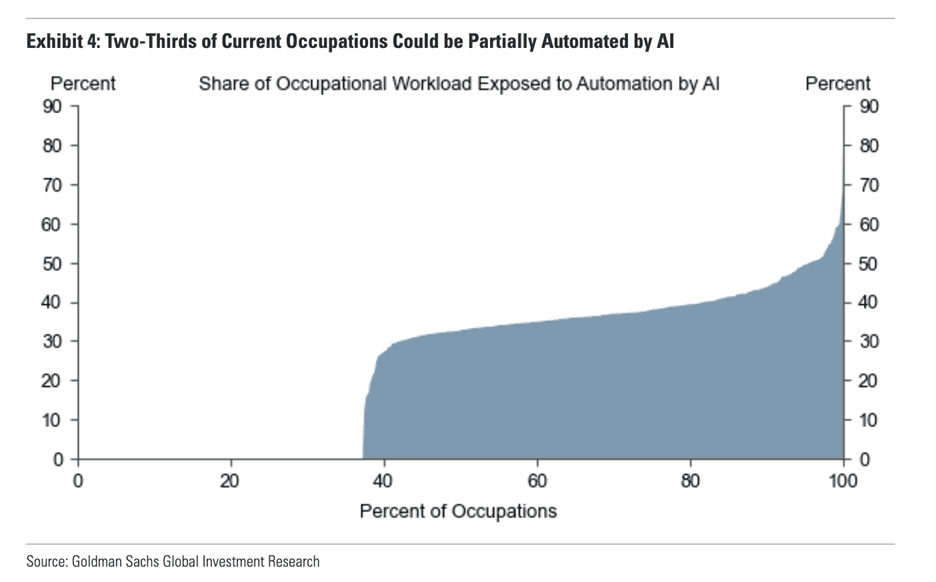Within the customer service sector, AI seamlessly complements the efforts of human agents to elevate the overall support experience. For example, while human representatives engage with customers, artificial intelligence provides crucial support, guiding agents towards the best solutions. Latest findings from Goldman Sachs indicate that artificial intelligence, especially Generative AI, could affect 300 million full-time jobs worldwide. One recent example being Klarna’s AI bot which replaced the job of 700 people, with customer service being a primary area of impact through agent augmentation and contact center automation.

While the concept of a fully autonomous AI assistant remains futuristic, current technologies such as smart assistants demonstrate the practical applications of AI in customer service. Some examples are Google’s Gemini, Meta’s LLaMa, Anthropic’s Claude and OpenAI’s GPT. These applications range from AI-enhanced interactions between customers and service representatives, streamlining email correspondences, improving the quality of support calls, to automating the scheduling of appointments and employing visual recognition for support purposes. Before delving into these specific applications, it’s important to first grasp the concept of AI’s role in customer service.
Defining AI in Customer Service
Customer service is vital for any business, encompassing support provided to customers before, during, and after a purchase. AI in customer service refers to the use of technologies like Teneo to boost these support functions. AI tools in this space include but are not limited to:
- Self-service with chat and voice bots
- Sentiment analysis
- Predictive analytics
- Summarizing content
- Natural Language Processing (NLP)
- Agent assist
Advantages of AI in Customer Service
The significance of customer service in shaping customer experiences is clear. When AI merges with customer service, it unlocks fantastic possibilities to enhance customer interactions by enabling:
- Mass Data Handling: AI quickly sifts through extensive customer data, allowing businesses to uncover deep insights that are not immediately obvious. With AI’s analytical prowess, companies can parse data from various customer interactions. Then, this info can be converted into actionable insights and identifying patterns in customer behavior and market trends.
- Reduced Average Handling Time (AHT): Incorporating AI, including Teneo’s chatbots and voice agent, streamlines customer interactions and cuts down on average handling times. Instant responses from chatbots and faster user verification via voice recognition ensure quicker issue resolution.
- Personalization of Experiences and Offers: AI forms distinct customer profiles by compiling interactions between brands and customers across various platforms. This information allows for targeted marketing and support. It results in highly personalized customer experiences, together with the inclusion of Adaptive Answers.
- Cost Efficiency: AI offers significant savings by automating tasks and highlighting inefficiencies. However, without efficient implementation and management, these benefits can be outweighed by high costs, undermining its overall cost-effectiveness.
- Automatic Entity Detection: Generative AI helps in easily identifying key details in a user’s input. This makes it simpler to grasp what the user means, aiding agents in responding more effectively.
- Automatic translation: Leveraging advanced AI algorithms, this feature offers real-time, accurate translation across various languages. This breaks down language barriers in global communication. This ensures that conversations are comprehensible to all parties involved, regardless of their native language, enhancing mutual understanding and collaboration.
- Summary of conversation: Utilizing sophisticated summarization techniques, AI can distill lengthy or complex dialogues into concise, easily digestible summaries. This allows for quick review and reference, ensuring that key points and decisions are clearly understood and retained, thereby improving follow-up actions and decision-making processes.
- Enhanced Support Quality: AI-powered quality management systems provide insights into team efficiency and customer service metrics, facilitating continuous improvement in service quality.
Potential Risks with AI in Customer Service
Using AI in Customer Service does come with some great benefits, but there are also a couple potential risks you need to be aware of before making a commitment. Examples include:
- Data Privacy and Security: AI systems often require access to large amounts of personal data to function effectively. This raises concerns about data privacy, particularly regarding sensitive personal information (PII). There’s a risk of data breaches or misuse of customer data.
- AI Hallucinations: AI systems, especially those based on language models, can sometimes generate inaccurate, nonsensical, or irrelevant responses, known as hallucinations. In customer service, this could lead to the provision of incorrect information or responses that don’t make sense to customers. Two examples being the Air Canada AI bot lying to a customer and a car dealership selling a Chevrolet for 1$.
- Regulatory Compliance: AI systems must comply with various regulations, including those related to data protection (like GDPR). Non-compliance can result in legal issues and damage to the company’s reputation. This is especially relevant with the newly approved EU AI Act.
- Volume of Use: LLMs often operate on a usage-based pricing model, where costs are incurred based on the number of words processed or API calls made. High volumes of inquiries or inefficient use can lead to significant expenses. A study by MIT found that AI replacing humans in the workforce is still not a near-term reality. Focusing on jobs involving computer vision, the study revealed that only about 23% of workers could be cost-effectively replaced by AI. This low rate of feasible AI replacement is primarily due to the high costs of AI implementation and operation.
Main Applications of AI in Customer Service for Enterprises
AI-Enhanced Human Customer Service – Teneo combined with human agents, offers a more optimized customer service system. Teneo handles routine tasks, allowing human agents to focus on complex queries. Key features include:
- Context Maintenance: Teneo’s Conversational IVR tool plays a vital role in providing agents with essential customer context. It quickly retrieves relevant information such as past interactions or purchase histories, enabling agents to deliver more personalized and informed responses.

- Routine Query Automation: By handling routine queries, Teneo reduces the number of calls and messages that need human intervention. Furthermore, simple questions are directed to self-serve options like FAQ and RAG bots, which streamline the process and free up human agents for more complex issues.

- Intelligent Routing: Teneo boosts customer service efficiency by smartly assigning queries to the best-suited agents, easing team workloads and improving interaction quality. Its Natural Language Understanding (NLU) stands out with a 99% accuracy rate in identifying user intent. Additionally, Teneo’s intuitive interface allows even non-technical users to effectively use advanced machine learning for training, ensuring highly accurate user intent recognition.
- Timely Recommendations: During interactions, agents receive timely recommendations regarding content and product suggestions. This feature enhances the efficiency of the agents and contributes to a more relevant and helpful customer experience.
- Analytics: Teneo’s monitoring tools allow businesses to understand and validate RAG’s responses, ensuring AI interactions are aligned with business goals.

- Cost Reduction: Teneo’s FrugalGPT methodology, which offers a cost-effective way to deploy AI, addressing the typically high expenses associated with these technologies. Teneo can significantly reduce AI implementation costs, reportedly by up to 98%. Therefore, this makes it a practical choice for businesses seeking AI benefits without the hefty price tag.
A Prime Example of AI-Driven Customer Service
An excellent example of AI’s impact in customer service is seen in the case of a leading company (e.g., a major retail brand). They used Teneo to manage customer interactions across numerous locations. Furthermore, by integrating Teneo into their customer service, the company enhanced support quality and response times, benefiting both customers and agents.
Subscribe to Our Newsletter
See real results with the power of Teneo
Just as the retail brand revolutionized its customer service with Teneo, other businesses can leverage AI to transform their customer experiences. Interested in elevating your customer service with Teneo? Explore our solutions today.

